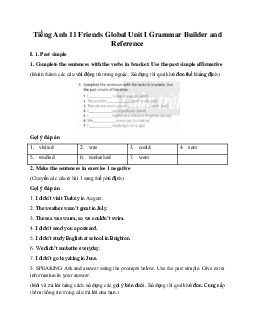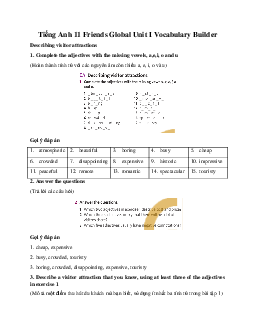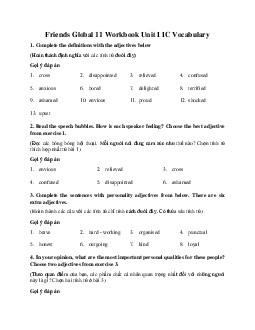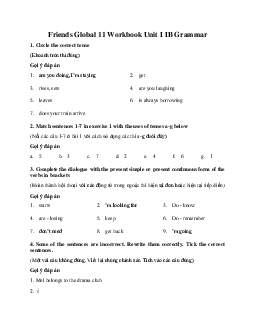




Preview text:
Tiếng Anh 11 Friends Global Unit Introduction IC Vocabulary
1. SPEAKING In pairs, describe the photos. Would you like to appear on stage in
theater production? Why? / Why not?
(Theo cặp, mô tả các bức ảnh. Bạn có muốn xuất hiện trên sân khấu trong những tác
phẩm sân khấu không? Tại sao có / Tại sao không?) Gợi ý đáp án
- Describe the photo: Looking at the picture I can see many people standing on the stage,
maybe at the school or at the theater. They are all wearing beautiful dark and red. They
might be in a team, I guess. The man is performing some funny actions, so I think they are actors in a comedy.
- I don’t like appearing on the stage to perform theater production because of two
reasons. Firstly, I am not confident in myself, so I’m afraid that I can’t have a good
performance. Secondly, I’m not a big fan of acting, I just like watching films or comedies to relax.
2. Read and listen to the dialogue. Why does Mason change from feeling anxious to feeling terrified?
(Đọc và nghe đoạn đối thoại. Tại sao Mason thay đổi từ cảm giác lo lắng sang cảm giác sợ hãi?) Gợi ý đáp án
Because Alex can’t come, and she has to sing his song before a lot of audiences without practicing before.
3. VOCABULARY Look at the adjectives below. Underline five of them in the dialogue in exercise 2.
(Nhìn vào các tính từ dưới đây. Gạch dưới năm trong số chúng trong cuộc đối thoại ở bài tập 2.) Gợi ý đáp án 1. excited 2. anxious 3. frightened 4. upset 5. terrified
4. Listen to the speakers. How is each person feeling? Choose from the adjectives in exercise 3.
(Lắng nghe các diễn giả. Cảm xúc của mỗi người như thế nào? Chọn tính từ trong bài tập 3.) Gợi ý đáp án
1. envious 2. confused 3. relieved 4. embarrassed 5. suspicious 6. excited Nội dung bài nghe
Speaker 1 Ooh, that’s a really nice phone. Is it new? Yes, it’s the latest model, isn’t it? I
wish I had one like that. One day, maybe ... if I win the lottery.
Speaker 2 Hang on, this doesn’t make sense. Tom said he was waiting for me at the café.
Now I’m at the café and he’s sending me messages saying ‘where are you?’. And there’s
only one café in this part of town. It’s all very strange.
Speaker 3 Here’s my passport! It was in my jacket pocket all along! I thought I’d lost it.
Now I remember, I put it in my pocket as I was leaving the plane. Phew! I was so worried for a while.
Speaker 4 Hey, Tom! Come over here a minute and help me with this. Oh, I’m so sorry.
I thought you were somebody else. He looks a bit like you. I mean, from behind. Sorry,
madam. My fault. Silly mistake.
Speaker 5 I think somebody’s been using my phone. Look – it says ‘incorrect password’.
But I haven’t entered the password yet. Somebody else entered one and it was incorrect.
Hmm. But who? Who was in this room while I was in the kitchen?
Speaker 6 It’s my birthday tomorrow. I can’t wait! I’m having a big meal with all my
friends. We’re going to a Mexican restaurant in town. We went there last year too. It was such a laugh!
5. VOCABULARY Work in pairs. Look at the list of personality adjectives below.
Then underline four more in the dialogue in exercise 2. How many other personality adjectives do you know?
(Làm việc theo cặp. Nhìn vào danh sách các tính từ tính cách dưới đây. Sau đó gạch chân
thêm bốn tính từ nữa trong đoạn hội thoại ở bài tập 2. Bạn biết bao nhiêu tính từ chỉ tính cách khác?) Gợi ý đáp án
Four personality adjectives in the dialogue: friendly, punctual, confident, brave.
6. Read the Look out! box. Complete the sentences with an -ed or -ing adjective
formed from the verbs in the brackets.
(Đọc khung Look out! Hoàn thành các câu với tính từ -ed hoặc -ing được hình thành từ
các động từ trong ngoặc.) Gợi ý đáp án 1. amazing 2. embarrassed 3. moving 4. surprised 5. bored
7. Read the Learn this! Box. Which adjectives from exercise 5 can have a negative
prefix? Use a dictionary to help you.
(Đọc Tìm hiểu điều này! Hộp. Tính từ nào trong bài tập 5 có thể có tiền tố phủ định? Sử
dụng từ điển để giúp bạn.) Gợi ý đáp án
7 adjectives from exercise 5 can have a negative prefix:
1. honest (adj) >< dishonest (adj)
2. kind (adj) >< unkind (adj)
3. loyal (adj) >< disloyal (adj)
4. organised (adj) >< disorganised (adj)
5. patient (adj) >< impatient(adj)
6. reliable (adj) >< unreliable (adj)
7. sensitive (adj) >< insensitive (adj)
8. SPEAKING Work in pairs. Ask and answer the questions.
(Làm việc theo cặp. Hỏi và trả lời câu hỏi.) Gợi ý đáp án
A: How do you think performers in the school show usually feel before and after a performance?
B: In my opinion, performers in the school show usually feel nervous and anxious before
standing in a big audience. However, when they are performing, I guess they feel excited.
And I think after a performance, some will feel satisfied, and others may feel relieved
because they completed their roles.
A: Do you mind speaking in public? B: Yes, definitely! A: Why?
B: I think I am an introverted person, so I don't like talking in front of a lot of people. If I
have to make a presentation in my class, I always practice overnight to make it smooth.
Speaking in public brings me the feeling of anxiety and unconfidence. I'm always scared
and my hands usually shake when I do that.




